
Vayalar Ramavarma, also known as Vayalar, was an Indian poet and lyricist of Malayalam language. He was known for his poems which include Sargasangeetham, Mulankaadu, Padamudrakal, Aayisha and Oru Judas janikkunnu and for around 1300 songs he penned for 256 Malayalam films. He received the National Film Award for Best Lyrics in 1972 and was the winner of the Kerala State Film Award for Best Lyricist in its year of inception which he received three more times. He was also a recipient of the Kerala Sahitya Akademi Award for Poetry in 1962. His collaborations with G. Devarajan produced the golden era of Malayalam film music and many songs written and composed by these duo remain the ever green classics in Malayalam. Ramavarma is regarded as one of the most successful and critically acclaimed lyricist in the history of Malayalam cinema.

K. Satchidanandan is an Indian poet and critic, writing in Malayalam and English. A pioneer of modern poetry in Malayalam, a bilingual literary critic, playwright, editor, columnist and translator, he is the former editor of Indian Literature journal and the former secretary of Sahitya Akademi. He is also social advocate for secular anti-caste views, supporting causes like environment, human rights and free software and is a well known speaker on issues concerning contemporary Indian literature. He is the festival director of Kerala Literature Festival.
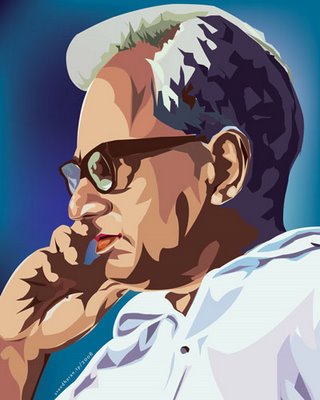
G. Sankara Kurup, also referred to as Mahakavi G, was an Indian poet, essayist and literary critic of Malayalam literature. Known as one of the greats of Malayalam poetry, he was the first recipient of the Jnanpith Award―the highest Indian literary honor. He served as a nominated member of the Rajya Sabha from 1968 to 1972 and received the Padma Bhushan, the third highest Indian civilian award, in 1967. He was also a recipient of Sahitya Akademi Award, Kerala Sahitya Akademi Award and Soviet Land Nehru Award.

Sugathakumari was an Indian poet and activist, who was at the forefront of environmental and feminist movements in Kerala, India.

Kunjunni, popularly known as Kunjunni Mash, was an Indian poet of Malayalam literature. Known for his short poems with a philosophical overtone, his works were popular among children as well as adults. He received several honors including three awards from the Kerala Sahitya Akademi viz. Kerala Sahitya Akademi Award for Children's Literature, Kerala Sahitya Akademi Award for Poetry and Kerala Sahitya Akademi Award for Overall Contributions.

D. Vinayachandran was an Indian Malayalam poet. He is one of the proponents of modern style of prose in Malayalam poetry. He was born in West Kallada, Kollam district and has worked as a Malayalam professor in various colleges for more than thirty years. He had his early education in schools in and around Kallada. After completing his master's in Malayalam literature from Government Sanskrit College, Pattambi, he entered the collegiate education service as a lecture and worked in various government colleges across Kerala. He joined the faculty of Mahatma Gandhi University, Kottayam, in 1991 and retired from University's School of Letters in 2006.

Attoor Ravi Varma was an Indian poet and translator of Malayalam literature. One of the pioneers of modern Malayalam poetry, Ravi Varma is a recipient of Kendra Sahitya Akademi Award, Kerala Sahitya Akademi Award for Poetry and Kerala Sahitya Akademi Award for Translation, besides many other honours. The Government of Kerala honoured him with their highest literary award, the Ezhuthachan Puraskaram, in 2012 and the Kerala Sahitya Akademi inducted him as their distinguished fellow in 2017.
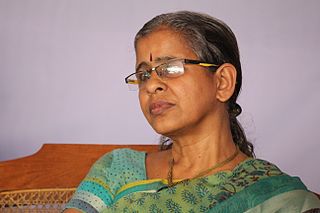
V. M. Girija is an Indian poet and essayist, writing in Malayalam language. She has published a number of books, which include Prem - Ek Album, the Hindi translation of her poetry anthology in Malayalam, Pranayam Oralbum. Kerala Sahithya Akademi awarded her their 2018 annual award for poetry and she is a recipient of 'Changmpuzha Award for literature' and the 'Basheer Amma Malayalam Puraskaram'.
N. V. Krishna Warrier was an Indian poet, journalist, scholar, academician and political thinker. A prolific writer, Warrier's works covered the genres of poetry, drama, travelogue, translation, children's literature and science. He was a recipient of the Sahitya Akademi Award and the Kerala Sahitya Akademi Award for Poetry. The Kerala Sahitya Akademi honoured him with their fellowship in 1986, three years before his death in 1989.
N. P. Mohammed, popularly known by his initials N. P., was an Indian novelist, short story writer and screenwriter of Malayalam language. Along with his contemporaries like M. T. Vasudevan Nair, O. V. Vijayan, Kakkanadan, and Madhavikutty, he was known to have been one of the pioneers of modernist movement in Malayalam fiction. He was the president of Kerala Sahitya Akademi and a recipient of several awards including Kendra Sahitya Akademi Award, Kerala Sahitya Akademi Award for Story, Kerala Sahitya Akademi Award for Novel, Lalithambika Antharjanam Award, Padmaprabha Literary Award and the Muttathu Varkey Award.
Vennikkulam Gopala Kurup (1902–1980) was an Indian poet, playwright, translator, lexicographer and story writer of Malayalam. He was the author of a number of poetry anthologies, besides other works, and he translated Abhijnana Shakuntalam, Tulsi Ramayana, Tirukkuṛaḷ, the poems of Subramania Bharati and two cantos of The Light of Asia of Edwin Arnold into Malayalam. He also contributed in the preparation of a dictionary, Kairali Kosham. A recipient of the Odakkuzhal Award and Thirukural Award, Kurup received the Kerala Sahitya Akademi Award for Poetry in 1966. Sahitya Akademi honoured him with their annual award in 1974.
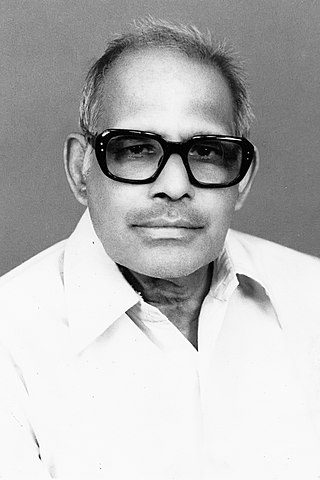
Olappamanna Mana Subramanian Namboothirippad, better identified by his family name, Olappamanna , was an Indian poet of Malayalam literature. A former chairman of Kerala Kalamandalam and an author of 20 books of poetry, his poems were noted for their explicit social expressions. He received two awards from Kerala Sahitya Academy and another from Kendra Sahitya Academy, besides honours such as Government of Madras Poetry Prize, Odakkuzhal Award, N. V. Puraskaram, Asan Smaraka Kavitha Puraskaram and Ulloor Award.
S. Guptan Nair was an Indian scholar, academic, critic and writer of Malayalam literature. Known for his literary works as well as for his oratorical skills, Nair was a prolific writer with over 35 books to his credit. He was a distinguished fellow of the Kerala Sahitya Akademi and a recipient of several honours including Kendra Sahitya Academy Award, Kerala Sahitya Akademi Award, Vayalar Award, Vallathol Award and Ezhuthachan Puraskaram, the last one being the highest literary award of the Government of Kerala.

V. Madhusoodanan Nair is an Indian poet and critic of Malayalam literature, who is credited with contributions in popularizing poetry through recitation. He is best known for Naranathu Bhranthan, the poem with the most editions in Malayalam literature as well as his music albums featuring recitations of his own poems and poems of other major poets. Kerala Sahitya Akademi honoured him with their annual award for poetry in 1993. He is also a recipient many other honours including Sahitya Akademi Award, Asan Smaraka Kavitha Puraskaram, Padmaprabha Literary Award, Kunju Pillai Award, R. G. Mangalom Award, Souparnikatheeram Prathibhapuraskaram and Janmashtami Puraskaram.
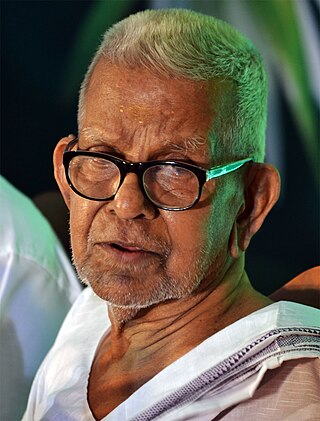
Akkitham Achuthan Namboothiri, popularly known as Akkitham, was an Indian poet and essayist who wrote in Malayalam. He was known for a simple and lucid style of writing, exploring themes of profound love and compassion in his works. Some of his prominent works included Irupatham Noottandinte Ithihasam, Balidarshanam, and Nimisha Kshetram.
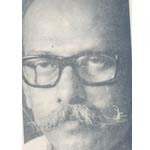
C. N. Sreekantan Nair (1928–1976) was an Indian independence activist, a Malayalam writer, short story writer, playwright and screenwriter, best known for his Ramayana trilogy – Kanchana Sita, Saketham and Lankalakshmi. He wrote 10 plays, 4 short story anthologies, book of non-fiction and collected works. Kerala Sahitya Akademi awarded him their annual award for drama in 1962. He was also a recipient of the M. P. Paul Prize.

N. Krishna Pillai was an Indian dramatist, literary critic, translator and historian of Malayalam language. Known for his realism and dramatic portrayal of psycho-social tensions, Pillai's plays earned him the moniker, Kerala Ibsen. He was a recipient of the Sahitya Akademi Award, Kerala Sahitya Akademi Award for Drama, Odakkuzhal Award, Vayalar Award and Kerala Sangeetha Nataka Akademi Award, besides other honours. The Kerala Sahitya Akademi inducted him as a distinguished fellow in 1979.
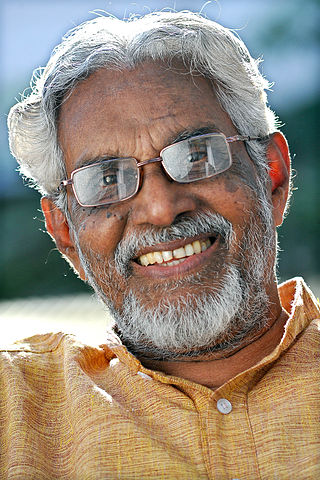
Puthussery Ramachandran Pillai was an Indian poet of the Malayalam language. He was a scholar of Dravidian linguistics and a professor of Malayalam for more than three decades. On 14 March 2020, he died of age-related illnesses.

Gopala Pillai Sankara Pillai, better known as G. Sankara Pillai, was an Indian playwright, literary critic, and director, known to be one of the pioneers of modern Malayalam theatre. A proponent of total theater, he was the founder of Nataka Kalari movement in Kerala and the chairman of the Kerala Sangeeta Nataka Akademi. He was a recipient of a number of awards including the Kerala Sahitya Akademi Award for Drama in 1964 for the work Rail Palangal and the Sangeet Natak Akademi Award for the best playwright in 1979.
Thattarassery Mathai Chummar, commonly identified as T. M. Chummar, was an Indian academic and writer of Malayalam literature, best known for his books on its history. An associate of G. Sankara Kurup and Vailoppilli Sreedhara Menon, Chummar's books on Kunchan Nambiar and C. V. Raman Pillai detail their literary contributions. He was a recipient of the title Sahitya Nipunan, conferred on him by the Rajah of Cochin. The Kerala Sahitya Akademi honoured him with the distinguished fellowship in 1986.
















